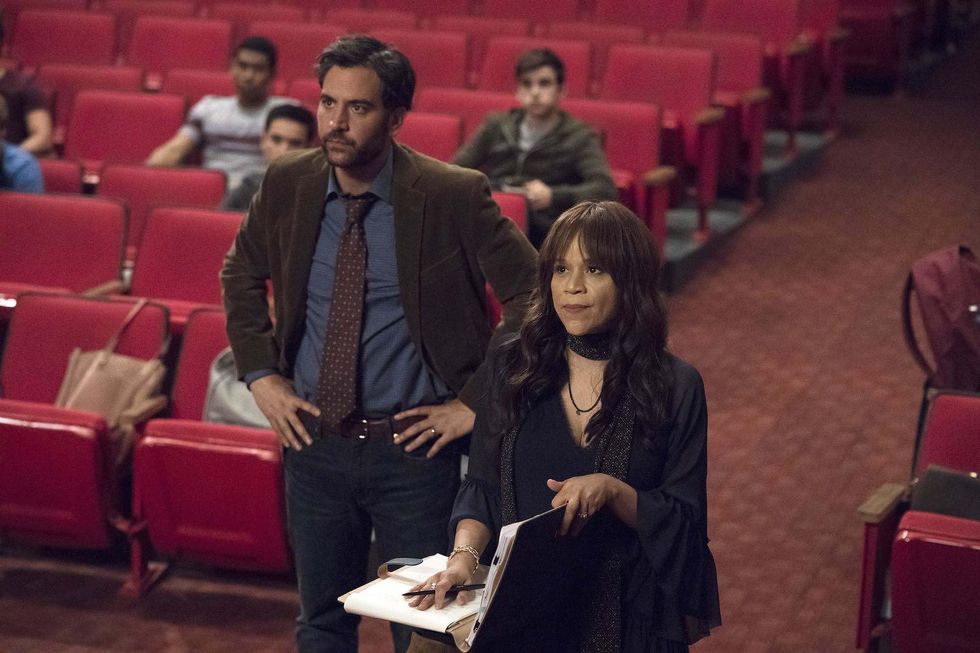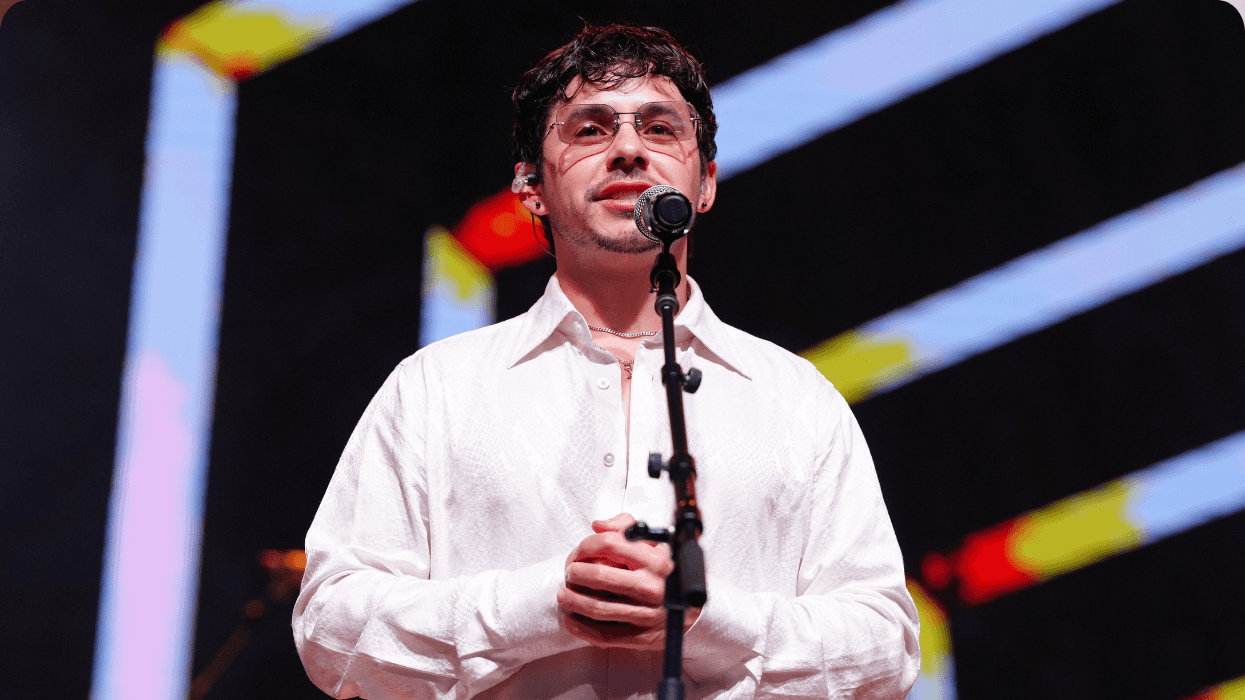Last week, NBC debuted its new drama Rise. The show has been described in various outlets as Glee-meets-Friday Night Lights, which is unsurprising, given that it was created and executive produced by the later show's head writer, Jason Katims. I've seen most of the season already, and while my initial reaction to the early episodes was less than favorable, I have to admit I've warmed to many of the characters and performances the more time I've spent with them.
Inspired by New York Times Magazine writer Michael Sokolove's 2013 book Drama High, the show tells the story of a Pennsylvania steel town English teacher's efforts to revitalize his high school's theater program by staging a production of Spring Awakening. I say "inspired by" rather than "based on," because Katims has taken significant liberties with his source material--the most controversial of which is rewriting real-life gay drama teacher Lou Volpe as the show's definitively straight lead, Mr. Mazzuchelli (Josh Radnor).
Having stuck with it, I think Rise may have the potential to become a great show. We've all had friends recommend shows with the caveat that you just have to power through the first batch of episodes--or skip them altogether--and Rise may be one of those. It's sincere and measured. Characters deepen as the season progresses and I'm here for that evolution. At the same time, though, I will never be able to let go of Katim's original sin: coopting the story of a gay man and rewriting it in his own heterosexual image.
When asked about the decision to center his show on a straight character rather than gay one at this year's Television Critics Association press tour, Katims said that he "took [the book] as an inspiration, and then I really felt like I needed to make it my own story."
Related | Rise Showrunners Discuss Changes from Book Inspiration, Respond to Straight-Washing Accusations
That's a stunning admission of cultural theft and erasure. The fact that Katims seemed to think it somehow constitutes a reasonable explanation highlights just how clueless he is about what he's done with his adaptation of Volpe's story.
Sokolove describes the real-life Volpe as an almost preternaturally intuitive teacher--a mentor who students often felt knew them better than they knew themselves. He suggests that Volpe's experience of being bullied as a child and of having athlete friends who would stick up for him probably informed his commitment to casting jocks in his productions, fostering connections between the school's theater and sports cliques. Over his 45-year career, he transformed his Pennsylvania high school's theater program into one of the best in the nation. He also spent many of those years in the closet, married to a woman.
By contrast, Radnor's character on Rise mirrors the unexamined privilege Katims seems to have so blithely deployed in adapting Volpe's story. Bored with teaching English lit to students he can't manage to inspire, Mr. Mazzu waltzes into his school's theater program and takes it over, pushing aside the dedicated Latina teacher Tracey Wolfe (Rosie Perez) who for years has worked tirelessly on low-budget productions of Grease and The Pirates of Penzance.
Mr. Mazzu and Tracey Wolfe. (Photo courtesy of NBCUniversal)
Mr. Mazzu is a classic disruptor. He assumes he can do basically everything better than it's already being done, despite his lack of experience, and makes everything about himself rather than the students he's teaching. He's got big ideas and wants to shake things up. But, rather than casting one of the workhorse drama kids who have put in the time and carved out a place for themselves in the high school hierarchy, he recruits the school's star footballer (Damon J. Gillespie) as the lead in Spring Awakening. Because, you know, he wanted to make the production his own. Katims has taken an inspiring, if complicated, gay character and refashioned him as an exasperating straight narcissist in the throes of a midlife crisis.
Obviously, adaptation is complicated. A lot stands to be lost, and at the same time, a lot stands to be gained in the translation from one medium to another. Generally, I'm not sure that deviations from source material matter that much if the end product is a worthwhile piece of art or entertainment. But I do think that the choices that are made in the course of an adaptation matter. In the case of Rise, Katims, a cisgender, ostensibly heterosexual male, took a true story with a gay man at its center and reframed it around a straight man. That is a choice that he made, that he owns, and whether he knows it or not, it sends a message to LGBTQ people that even our stories aren't our own. We can be written out of them, erased or sidelined by those in power.
To be fair, Rise is not without LGBTQ representation. There's a sweet, closeted religious teen (Ted Sutherland) struggling with his attraction to his much less conflicted co-star (Sean Grandillo). There's a trans character played by real-life non-binary actor Ellie Desautels. And a plot point late in the season plays as a misguided attempt to pay oblique homage to Volpe's years in the closet. But these are secondary and tertiary characters. The show spends considerably more time on Mr. Mazzu's home life, Gillespie's character's budding romance with a blossoming ingenue (Auli'I Cravalho) from the wrong side of the tracks, the football coach's affair with a student's mother, etc.
Katims has argued that his show doesn't "shy away" from LGBTQ issues, but that is precisely what it does. I'm not willing to give him points for relegating to the wings characters and storylines that should have taken center stage. We've seen versions of this story before in everything from Glee to Dead Poets Society. We've seen the complicated teacher who inspires his students with his unconventional approach to literature or music or poetry or theater. We've even seen an increasingly varied array of gay teen coming out and coming of age stories.
What we haven't seen is a show with a deeply closeted middle age leading man. It would be a truly risky move to build a network drama like Rise around such a character. It would require audiences to empathize with someone capable of incredible deception as well as inspiration. A show like that would have to reckon with the damage done by decades spent in the closet. It would have to take a hard look at what made a good, decent man believe he had to lie to himself and to those closest to him. Maybe that's too big an ask.
Instead, Rise presents us with a much more familiar story. With Radnor's character squarely at its center, the show simply reinforces the pervasive TV trope that LGBTQ people are part of the rich tapestry that serves as a backdrop for straight people's lives. We're there in the B plots; we're the supporting roles, but never the focus of the show.
Worst of all, Katims is guilty of a profound act of cultural theft. What Lou Volpe did for his students and his community was a major achievement. With Rise, Katims attributes that achievement, the story of how it came to be, to a heterosexual man. It robs us of the story of a gay hometown hero. Whatever the show's merits--and it's not without them--they can't mitigate that fact. Rise should have been the story of a complicated LGBTQ hero. Instead, a straight guy made it his own.






























